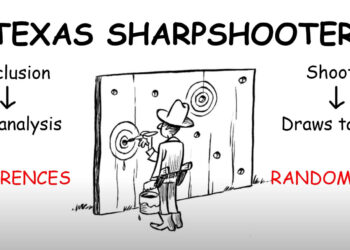After a week of soul-searching posts and great concern for the future on The Scholarly Kitchen, it’s time to blow off a little steam. We live in such a complex world that there’s no one easy target to shout at, so instead, we present John Oliver’s kiss-off to the entire year that was 2016 so far, in hopes that 2017 won’t be worse.
Some NSFW salty language in the video below, so turn down your speakers or use headphones if you’re in a public space.
Discussion
22 Thoughts on "2016 In Review"
The Scholarly Kitchen is supposed to be apolitical but it seems like this week’s posts have been rather anti-Trump.
Who says what The Scholarly Kitchen is “supposed to be”? Go read our “About” page, where it states, “The Scholarly Kitchen is a moderated and independent blog aimed to help fulfill this mission by bringing together differing opinions, commentary, and ideas, and presenting them openly.”
Sometimes openly presenting opinions involves having an opinion.
Also read the disclaimer to the side of your comment:
“Opinions on The Scholarly Kitchen are those of the authors. They are not necessarily those held by the Society for Scholarly Publishing nor by their respective employers.”
My mistake, but I thought someone said that earlier. As an issue analyst I have been tracking the political rhetoric with great interest. There are a great many anti-Trump blog posts but as well a great many pro-Trump, all auguring a new future. I suppose a bit of balance here is not feasible.
Basically our charge to our authors is to keep things in the realm of scholarly publishing or at least the larger communication sphere, but we don’t restrict their ability to express an opinion. If one of our bloggers wishes to write a post extolling how an anti-science president with seemingly little regard for factual accuracy is a good thing for scholarly publishing, then I’d be very interested in reading it.
That said, I personally feel that an overemphasis on “balance” is a big factor in why we ended up where we are. After decades of accusations of a liberal bias in the media, it is now too timid to offer up even the simplest of opinions or factual analysis without also presenting the case for the other side, even if that means bringing in a moon landing denier or someone who thinks vaccines cause autism, just for the sake of “balance”. This creates a false equivalency, and promotes the idea that all ideas are equally valid, which leads us back to David Smith’s post on a post-factual world.
Is there a conservative Chef? Beyond that all I can say is that your rhetoric is characteristic of the general liberal/progressive form. There is nothing wrong with this, except that people need to understand that TSK is a liberal/progressive blog. This is especially important in terms of the policy issues discussed. It seems that political diversity is not a goal. This may be a limitation.
To be fair, reality has a well-known liberal bias (https://en.wikiquote.org/wiki/Stephen_Colbert). I won’t dare to speak for any of my fellow bloggers as to their political leanings.
When you say conservative, do you mean somebody who supports Donald Trump?
I have no intention of speaking for everybody else’s views, but I don’t necessarily see that a traditional conservative would be a Trump supporter. Party loyalty aside, he’s not really a Republican, at least according to the campaign rhetoric. He’s not a proponent of small government, he’s directly advocated using the power of the government to fix things; talking about mass deportations, building walls, and punitive taxes on companies that out-source. That’s about as un-conservative as you can get. The last one is almost Maoist. He’s also spoken against free trade agreements, a previously central tenet of Republicanism. He’s also in favour of eminent domain and now seems to be in favour of more than one of the key pillars of Obamacare.
So, I don’t take it as read that a Republican or conservative would necessarily support Trump. He’s not really aligned with either party’s traditional positions, he appears to be more of an authoritarian populist than anything else. I suspect that we don’t have any of those on the kitchen, but like I say, I don’t want to speak for anybody.
I meant political conservative per se. This is something that has concerned me for a long time. Policy is my field and whenever policy issues come up the Chefs seem to take the liberal view. Just an expert impression, mind you.
But I imagine most conservatives voted for Trump, else he would not have been elected. Surely few liberals or progressives voted for him. Taken as a whole his positions are clearly conservative.
By the way, proponents of small government are Libertarians, not Republicans. Republicans, as you well put it, directly advocate using the power of the government to fix things. They just disagree with Democrats as to what needs to be fixed, or how to fix it. Both parties grow the government relentlessly, as no doubt will Trump. In fact the one thing that Trump does, maybe the only big thing but probably the biggest in any case, is to free the Republican Congress to finally act. The real power to change things lies with Congress, not the President, but few seem to be looking that way.
Well he might be anti-science, but he’s still pro-business, no? And considering how lucrative the business of scholarly publishing is, it’s unlikely that he’ll impose any measures jeopardizing it and making it more precarious; especially so for US publishers if he’s a protectionist as it’s generally reported.
In that light, this week’s posts really do seem overly dramatized at times.
If you look at the affiliations of the authors of those pieces, you’ll see three of them working in the not-for-profit sphere and the fourth as a vendor offering support across the entire publishing landscape. So, like many in the scholarly communications world, our concerns run beyond just the almighty dollar.
And to be honest, I’m not sure our President-Elect can be depicted as “pro-business” because he’s something of an unknown quantity, with many contradictory positions, and many stated positions being rapidly walked back. Are you pro-business if you want to impose massive tariffs and fine companies for optimizing profits by moving operations offshore? That level of uncertainty is at the root of much of the anxiety. We don’t know what he stands for nor what he will actually attempt to do.
Well being preemmptively mopey doesn’t make sense either then now does it?
You chefs have an obligation to maintain this kitchen, and that means maintaining editorial quality even in face of adversity and emotional distress caused by Donald’s election.
Besides, with media already being congested with Trump drama, why bring it here as well? What value does that add to SK?
It is difficult to not be “preemmptively mopey” (sic) when one has distressed friends and relatives who are gravely concerned about the ongoing status of their marriages or their ability to stay in the country. A skeptical outlook seems a reasonable approach, and this would have been the case regardless of who won the election, it’s just that our skepticism would have been focused on different issues. Given that “Validation” and “Filtration” are key key services scholarly publishers provide, it seems reasonable to think about how they are being de-valued in our society and what impact that may have on what we do.
You chefs have an obligation to maintain this kitchen, and that means maintaining editorial quality even in face of adversity and emotional distress caused by Donald’s election.
No. We are under no obligation to live up to any imaginary standards any individual reader may choose to impose. We are only obligated to write about the things that interest us and that we find important. If this fails to meet your criteria for editorial quality, there are many other blogs out there where you may instead choose to spend your time.
Fair point, but be careful not to alienate your global readership by framing everything in low-effort Trump parallels from now on, that’s all.
Also don’t show your readers the door for a few critical comments; it’s bad form and reinforces the filter bubble.
I think it was less showing you the door than making it clear that we are not your performing monkeys. If you have something to add to the conversation, or a critique of what was written, great, but people are going to write about what they’re going to write about. I suspect you’ll find that we aren’t all-Trump, all-the-time, but the week after a potentially history-altering occurrence, it doesn’t seam unreasonable for anyone to think about their place in a changing world.
Lucrative! Publishing is not very lucrative to most and that is why consolidation is occurring. From where do you get these strange notions?
From the massive profit margins commanded by those driving the consolidation and easily paying off any semblance of competition in the field.
There’s no better indication of lucrativeness than that.
Has the year ended already???
I’m trying to put together a consensus of folks to declare this to be the case. I’ve had enough of 2016. The next 45 or so days will be a timeless period where no beloved musicians can die and no political surprises will occur. Who’s in?
Well, it was a nice thought, but 2016 continues to hammer away at us. RIP Sharon Jones: http://sharonjonesandthedapkings.com/
Brilliant post, David. Sums it all up quite nicely I think!



